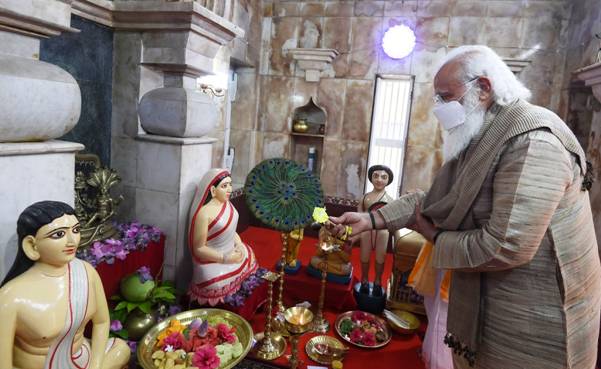
The Matua community is a religious and social group in India, primarily located in the states of West Bengal and Assam. Here’s a detailed look at who they are and their socio-political context:
Who are the Matuas?
- Origin and Founder: The Matua sect was founded in the 19th century by Harichand Thakur in East Bengal (now Bangladesh). His teachings were aimed at uplifting the socially and economically marginalized communities.
- Religious Beliefs: The Matua faith combines elements of Hinduism and social reform. They follow the teachings of Harichand Thakur and his son, Guruchand Thakur, emphasizing the worship of a formless god and advocating for social equality and education.
- Community and Practices: Matuas reject caste distinctions and idol worship, promoting egalitarian values. They hold large congregations called “Mela” to celebrate their religious and cultural identity.
Are They Dalits?
- Caste Background: Yes, the Matua community largely consists of Dalits, specifically from the Namasudra caste, which is traditionally considered a low caste within the Hindu social hierarchy.
- Social and Economic Status: Historically, Namasudras were engaged in agriculture and faced significant social and economic discrimination. The Matua movement has played a significant role in their social mobilization and self-respect.
Socio-Political Influence
- Migration and Demographics: A significant number of Matuas migrated to West Bengal and Assam during the Partition of India in 1947 and later due to religious persecution in East Pakistan (now Bangladesh).
- Political Significance: In recent years, the Matua community has become a significant vote bank in West Bengal and Assam. Political parties, including the Trinamool Congress (TMC) and Bharatiya Janata Party (BJP), have actively sought their support.
- Citizenship Issues: The community has been at the center of debates on citizenship and refugee status in India. The National Register of Citizens (NRC) and the Citizenship Amendment Act (CAA) have been particularly pertinent issues, with political parties making various promises to address their concerns.
Current Status
- Cultural Identity: Matuas maintain a strong cultural identity with a sense of pride in their heritage and the teachings of Harichand and Guruchand Thakur.
- Social Mobility: The community has made strides in education and socio-economic status, but many still face challenges related to caste-based discrimination and economic hardship.
In summary, the Matua community is indeed a Dalit group, primarily from the Namasudra caste, with a rich religious and social reformist heritage. They have a significant socio-political presence, especially in West Bengal and Assam, and continue to influence and shape regional politics and social dynamics.
BJP’s Matua Outreach
The BJP’s outreach to the Matua community is a key component of its electoral strategy in West Bengal. The Matua community, founded by Harichand Thakur in the 19th century, has a significant influence in the state’s socio-political landscape. With a population estimated to be around 3 million in West Bengal, the Matuas hold considerable sway in several constituencies, particularly in North and South 24 Parganas, Nadia, and parts of Howrah and Hoogly.
Strategies and Actions:
- Political Inclusion: The BJP has actively included Matua leaders in its ranks. Shantanu Thakur, a descendant of Harichand Thakur, is a prominent BJP leader and a Member of Parliament (MP) from Bangaon.
- Economic and Social Initiatives: The BJP has promised various welfare schemes targeting the Matua community, including better housing, healthcare, and educational facilities.
- Cultural Engagement: By engaging with the cultural and religious aspects of the Matua community, the BJP aims to create a strong emotional connection. For instance, the BJP has supported the celebration of Matua festivals and cultural events.
Shantanu Thakur as Central Minister
Shantanu Thakur’s inclusion in the central cabinet is a strategic move to consolidate the Matua vote bank. As a central minister, he can address the community’s issues at a national level and ensure that their concerns are represented in policymaking. This appointment serves multiple purposes:
- Symbolic Representation: It signals the BJP’s recognition and respect for the Matua community.
- Political Mobilization: By elevating a Matua leader to a significant position, the BJP aims to mobilize the community’s support in elections.
- Policy Advocacy: As a central minister, Thakur can push for policies benefiting the Matua community, such as the implementation of the Citizenship Amendment Act (CAA).
Citizenship for Bangladesh Refugees
The Citizenship Amendment Act (CAA), passed in 2019, is central to the BJP’s appeal to the Matua community. The act provides a pathway to Indian citizenship for non-Muslim refugees from Pakistan, Bangladesh, and Afghanistan who entered India on or before December 31, 2014. For the Matua community, many of whom migrated from Bangladesh, the CAA promises to resolve long-standing issues of citizenship and identity.
Key Aspects:
- Legal Recognition: The CAA aims to grant legal recognition to Matua migrants, ensuring their rights and entitlements as Indian citizens.
- Social Security: Citizenship would provide the Matuas with access to various social security benefits, including healthcare, education, and employment opportunities.
- Political Empowerment: As citizens, the Matuas would have a stronger political voice and greater influence in the electoral process.
Modi’s Visit to Harichand Thakur Shrine
Prime Minister Narendra Modi’s visit to the Harichand Thakur shrine in Orakandi, Bangladesh, was a significant gesture aimed at winning the hearts of the Matua community in West Bengal. This visit took place in March 2021, just before the West Bengal assembly elections.
Significance of the Visit:
- Spiritual Connection: By visiting the birthplace and shrine of Harichand Thakur, Modi underscored the BJP’s respect for the Matua faith and its founder.
- Political Message: The visit was a clear message to the Matua community that the BJP values their cultural heritage and is committed to addressing their concerns.
- International Diplomacy: The visit also highlighted India’s cultural and historical ties with Bangladesh, strengthening bilateral relations.
Matua Dynamics with Bengali Bhadralok
The term “Bhadralok” refers to the upper and middle-class educated Bengalis who have traditionally held socio-economic and cultural dominance in West Bengal. The Matua community, being primarily Dalit and economically disadvantaged, has historically been marginalized by the Bhadralok elite.
Dynamics and Tensions:
- Social Hierarchy: The Bhadralok have often been seen as gatekeepers of culture and political power, while the Matuas have struggled for recognition and social mobility.
- Political Shift: The BJP’s outreach to the Matuas represents a shift in the political landscape, challenging the dominance of Bhadralok-centric parties like the Trinamool Congress (TMC) and the Communist Party of India (Marxist) (CPI(M)).
- Electoral Impact: By aligning with the Matua community, the BJP aims to break the traditional vote banks of the Bhadralok dominated parties and create a new coalition of voters, including Dalits, OBCs, and other marginalized groups.
Conclusion: The BJP’s engagement with the Matua community is a multifaceted strategy involving political inclusion, policy promises, cultural engagement, and symbolic gestures. This approach aims to consolidate the Matua vote bank, challenge the traditional dominance of the Bhadralok, and reshape the electoral dynamics in West Bengal.

Kalyan Chandra
Kalyan chandra is a political strategist, media and communication consultant with the expertise in public relations, marketing, political research, election campaign management, psephology and digital analytics. He focuses on strategic political consulting, offering services that include competitive research, public opinion collection, and digital media management. Kalyan has significantly contributed to successful campaigns across India with his meticulous approach and deep understanding of the political landscape.
